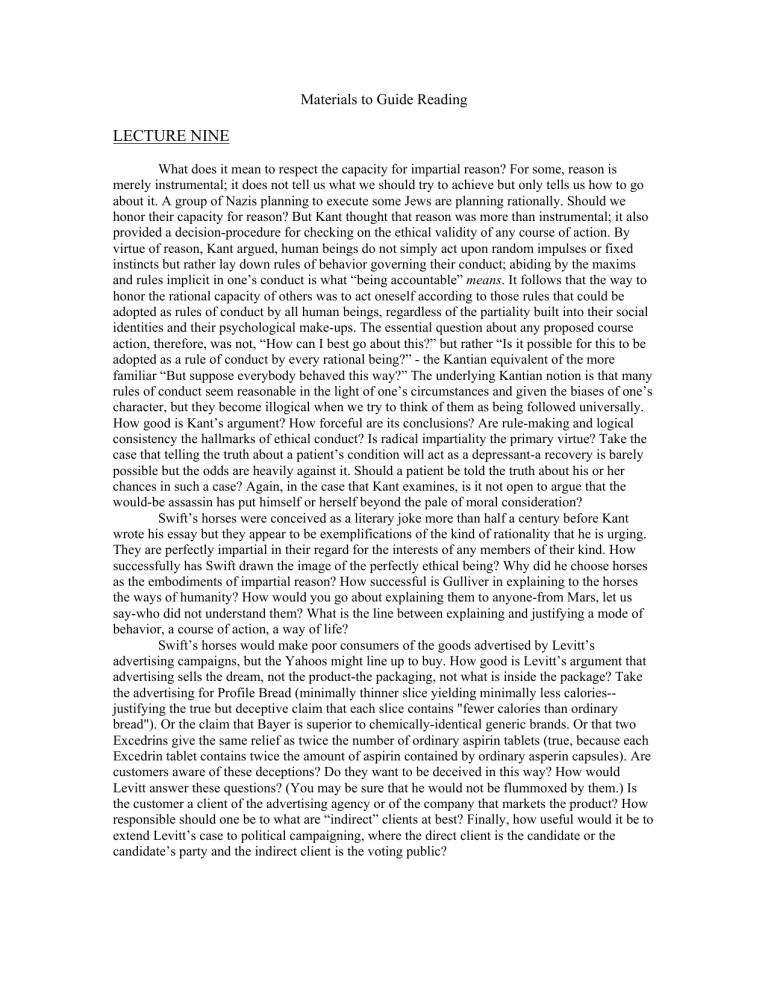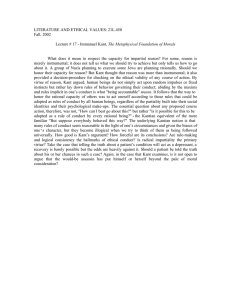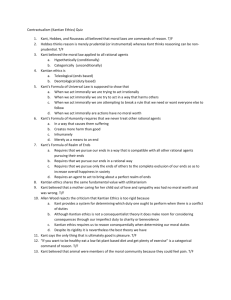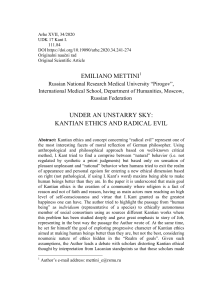LECTURE NINE Materials to Guide Reading

Materials to Guide Reading
LECTURE NINE
What does it mean to respect the capacity for impartial reason? For some, reason is merely instrumental; it does not tell us what we should try to achieve but only tells us how to go about it. A group of Nazis planning to execute some Jews are planning rationally. Should we honor their capacity for reason? But Kant thought that reason was more than instrumental; it also provided a decision-procedure for checking on the ethical validity of any course of action. By virtue of reason, Kant argued, human beings do not simply act upon random impulses or fixed instincts but rather lay down rules of behavior governing their conduct; abiding by the maxims and rules implicit in one’s conduct is what “being accountable” means . It follows that the way to honor the rational capacity of others was to act oneself according to those rules that could be adopted as rules of conduct by all human beings, regardless of the partiality built into their social identities and their psychological make-ups. The essential question about any proposed course action, therefore, was not, “How can I best go about this?” but rather “Is it possible for this to be adopted as a rule of conduct by every rational being?” - the Kantian equivalent of the more familiar “But suppose everybody behaved this way?” The underlying Kantian notion is that many rules of conduct seem reasonable in the light of one’s circumstances and given the biases of one’s character, but they become illogical when we try to think of them as being followed universally.
How good is Kant’s argument? How forceful are its conclusions? Are rule-making and logical consistency the hallmarks of ethical conduct? Is radical impartiality the primary virtue? Take the case that telling the truth about a patient’s condition will act as a depressant-a recovery is barely possible but the odds are heavily against it. Should a patient be told the truth about his or her chances in such a case? Again, in the case that Kant examines, is it not open to argue that the would-be assassin has put himself or herself beyond the pale of moral consideration?
Swift’s horses were conceived as a literary joke more than half a century before Kant wrote his essay but they appear to be exemplifications of the kind of rationality that he is urging.
They are perfectly impartial in their regard for the interests of any members of their kind. How successfully has Swift drawn the image of the perfectly ethical being? Why did he choose horses as the embodiments of impartial reason? How successful is Gulliver in explaining to the horses the ways of humanity? How would you go about explaining them to anyone-from Mars, let us say-who did not understand them? What is the line between explaining and justifying a mode of behavior, a course of action, a way of life?
Swift’s horses would make poor consumers of the goods advertised by Levitt’s advertising campaigns, but the Yahoos might line up to buy. How good is Levitt’s argument that advertising sells the dream, not the product-the packaging, not what is inside the package? Take the advertising for Profile Bread (minimally thinner slice yielding minimally less calories-justifying the true but deceptive claim that each slice contains "fewer calories than ordinary bread"). Or the claim that Bayer is superior to chemically-identical generic brands. Or that two
Excedrins give the same relief as twice the number of ordinary aspirin tablets (true, because each
Excedrin tablet contains twice the amount of aspirin contained by ordinary asperin capsules). Are customers aware of these deceptions? Do they want to be deceived in this way? How would
Levitt answer these questions? (You may be sure that he would not be flummoxed by them.) Is the customer a client of the advertising agency or of the company that markets the product? How responsible should one be to what are “indirect” clients at best? Finally, how useful would it be to extend Levitt’s case to political campaigning, where the direct client is the candidate or the candidate’s party and the indirect client is the voting public?







